Series: TST Framework > Five Thought Tools > Four Mind Traps > Three Truth Hammers
Abstract: The Five Thought Tools help you gather, frame, and communicate accurate information. Engaging in healthy research and reviewing is essential for acquiring accurate information. Knowing yourself, who you’re interacting with, reality, and logic is the key to effective critical thinking, decision-making, and communication. The Five Thought Tools are at the core of the TST Framework. With this foundation in place, it is hard to go wrong, but the Four Mind Traps help you stir around potholes, and you can rely on the Three Truth Hammers to save you time.
Five essential skills for thinking that transform information into wisdom.
To become a great thinker, you must dig into the Five Thought Tools as best you can, but these five tools are enormous, so mastery, which is not needed for most, will take time. Focus on a top-down understanding. Meaning, get familiar with all five at a basic level, which is all that’s needed for everyday life. Over time, increase that knowledge to an intermediate level to become a really good everyday thinker. If you are or wish to become a master thinker, you need an advanced level of understanding on all five thought tools as well as complete mastery of the 3 anchor views, as many social constructs as you can muster, and the 3 types of logic. As a master thinker, that’s your focus within the Five Thought Tools.
- Open Viewpoint Method – 3 Viewpoints (True Believer, Empiricist, True Skeptic) and viewpoint prevention.
- Idea of Ideas – Understanding research and inquiry of the empirical, rational, and irrational from speculative ideas to scientific laws.
- Reasoning – The 3 types of logic (deductive, inductive, and abductive).
- Social Constructs – Identifying social constructs, and understanding 10 core social contracts: language, names, base-10, zero, time, calendars, ownership, money, musical notation, and IQ.
- Idea Evaluation – This tool questions and validates ideas: Occam’s Razor, Socratic Method, Peer Review, Debates, and comparative analysis. Here, you learn to assess the validity and quality of ideas—whether they’re your own or someone else’s.
Next >>
Series: TST Framework > Five Thought Tools > Four Mind Traps > Three Truth Hammers













